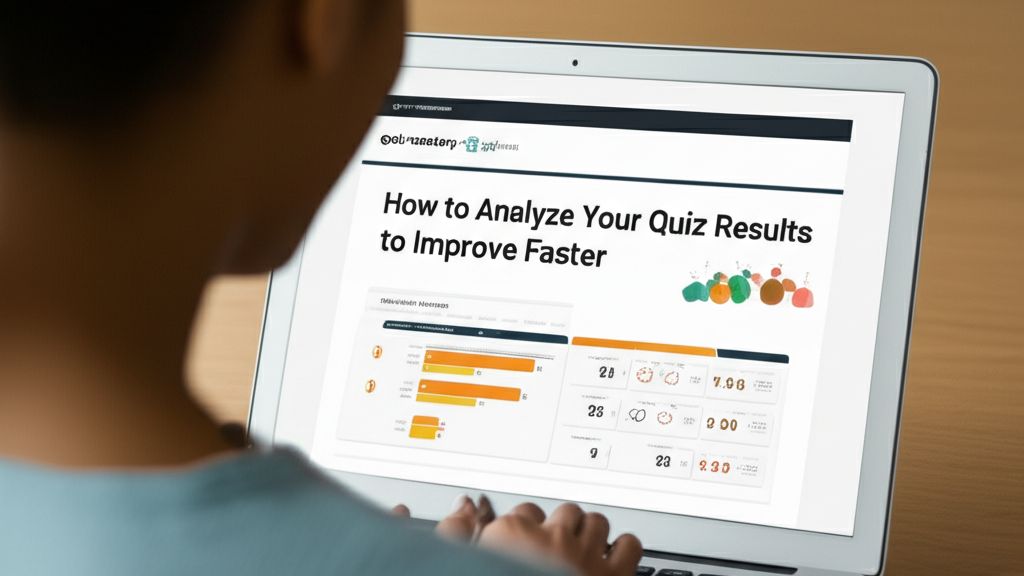
How to Analyze Your Quiz Results to Improve Faster
So, you’ve just finished a quiz. Congratulations! But the real learning begins after you click that submit button. Don’t just glance at your score and move on. Instead, treat your quiz results like a treasure map leading to improved understanding and faster learning. Let’s explore how to decipher that map!
1. The Overall Score: Just the Beginning
Your overall score is a good starting point, but it doesn’t tell the whole story. It’s like knowing the final score of a basketball game – it tells you who won, but not how they won. Did you barely squeak by, or did you dominate? A high score might indicate mastery, but it could also mean you got lucky with educated guesses. A low score signals areas needing attention, but it doesn’t pinpoint specific weaknesses.
2. Category Breakdown: Find Your Weak Spots
Most quizzes, especially those designed for learning, break down your performance by category or topic. This is where the real insights begin. Identify the areas where you consistently struggled. Are you consistently missing questions on algebraic equations, but acing geometry problems? Or are you great at understanding theoretical concepts but struggle with practical applications? This granular view helps you focus your studies on the areas that need the most work.
3. Question-by-Question Analysis: Uncover the “Why”
Go through each question, whether you got it right or wrong. For incorrect answers, understand why you made the mistake. Was it:
- A Knowledge Gap: Did you simply not understand the underlying concept? This indicates a need for more in-depth review of the material.
- A Careless Error: Did you misread the question, make a calculation mistake, or rush through the answer choices? These errors suggest a need to slow down and pay closer attention to detail.
- A Test-Taking Strategy Issue: Did you struggle with time management, get confused by the wording of the question, or fall for a distractor answer? This highlights areas where you can improve your test-taking strategies.
- Misunderstanding of Question Type: Some questions require application of knowledge than direct recollection. Review the specific type of questions you’re struggling with and practice more questions of the same type.
For correct answers, especially if you were unsure, review the question and explanation to solidify your understanding. You might have guessed correctly, but ensuring you understand the reasoning prevents similar errors in the future.
4. Identify Patterns: Connect the Dots
Look for patterns in your mistakes. Are you consistently struggling with questions that require critical thinking? Or are you making the same type of calculation error repeatedly? Identifying these patterns can reveal underlying weaknesses in your understanding or your approach to problem-solving.
5. Adjust Your Study Plan: Tailor Your Approach
Based on your analysis, adjust your study plan to address your identified weaknesses. Spend more time on the topics where you struggled, practice the types of questions you missed, and refine your test-taking strategies.
- Prioritize weak areas: Allocate more study time to those specific topics.
- Seek additional resources: If you’re struggling with a particular concept, consult different textbooks, online resources, or ask for help from a tutor or teacher.
- Practice similar questions: Work through additional practice problems to reinforce your understanding and improve your problem-solving skills.
- Refine test-taking strategies: Practice time management techniques, learn how to identify distractor answers, and develop strategies for approaching different types of questions.
6. Track Your Progress: Measure Your Improvement
Keep track of your progress by analyzing your results from subsequent quizzes. Are you improving in the areas where you previously struggled? Are you maintaining your strengths? Tracking your progress will help you stay motivated and ensure that your study efforts are paying off. Review your progress and adjust the strategies as needed.
7. Don’t Be Afraid to Experiment
Effective learning often involves experimentation. Try different study techniques, time management strategies, or question-answering approaches to see what works best for you. If something isn’t working, don’t be afraid to try something new.
By taking the time to analyze your quiz results effectively, you can transform quizzes from simply a measure of your current knowledge to a powerful tool for accelerating your learning and achieving your goals. So, embrace the feedback, learn from your mistakes, and watch your understanding grow!